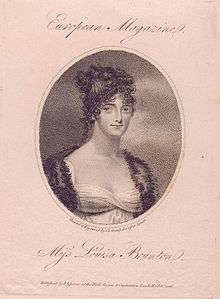Louisa, Countess of Craven
Louisa, Countess of Craven, originally Louisa Brunton (1785?–1860) was an English actress.[1]

Birth and background
Her father, John Brunton, son of a soap dealer in Norwich, was at one time a grocer in Drury Lane. He was an actor, and appeared at Covent Garden Theatre, 11 April 1774, as Cyrus, and, 3 May 1774, as Hamlet. He then played at Norwich and at Bath, Somerset, becoming ultimately manager of the Norwich theatre. Louisa Brunton was the youngest of six sisters, one of whom, Ann Brunton (1769–1808), was also an actress, and married Robert Merry.[2] According to some biographers, she was born in February 1785; but the date may have been two or three years earlier. She was aunt to the actress Miss Brunton, afterwards Mrs. Yates.[1]
Stage career
On 5 October 1803 Brunton made her first stage appearance, at Covent Garden, playing Lady Townley in the Provoked Husband to the Lord Townley of Kemble. On 2 November she played Beatrice in Much Ado about Nothing.[3] She was the original creator of some roles in pieces of Thomas Morton, and William Dimond. On 21 October 1807 she played Clara Sedley in Frederic Reynolds's comedy The Rage. This is the last appearance recorded by John Genest. Her brother, who appeared at Covent Garden 22 September 1800 as Brunton the younger, was with her during her entire time at the theatre.[1]
Marriage
Brunton left the stage in December 1807, and married, 30 December 1807, William Craven, 1st Earl of Craven. After the death of her husband, 30 July 1825, she lived in privacy, and died, almost forgotten, 27 August 1860.[1]
Notes
- 1 2 3 4
 Stephen, Leslie, ed. (1888). "Craven, Louisa". Dictionary of National Biography. 13. London: Smith, Elder & Co.
Stephen, Leslie, ed. (1888). "Craven, Louisa". Dictionary of National Biography. 13. London: Smith, Elder & Co. - ↑ Dorothy A. Mays (1 January 2004). Women In Early America: Struggle, Survival, And Freedom In A New World. ABC-CLIO. p. 262. ISBN 978-1-85109-429-5. Retrieved 30 June 2013.
- ↑ Her name also appears in this season to Marcella in The Pannel, a farce based by John Philip Kemble on Isaac Bickerstaff's Tis well it's no worse, 21 December 1803. Between this date and December 1807 she played Julia in The School of Reform (Thomas Morton), Miss Mortimer in the Chapter of Accidents (Sophia Lee), Celia in As you like it, Rosara in She would and she would not (Colley Cibber), Alithea in The Country Girl (David Garrick), Lady Anne in Richard III, Irene in Barbarossa (John Brown) to the Achmet of Master Betty, Dorinda in The Beaux' Stratagem, Marianne in the Mysterious Husband (Richard Cumberland), Hero in Much Ado about Nothing, Angelina in Love makes a Man (Cibber), Ismene in Merope (Aaron Hill), Anne Bullen in Henry VIII, Volante in The Honey Moon (John Tobin), Donna Olivia in A bold Stroke for a Husband (Hannah Cowley), Miranda in The Tempest, Leonora in The Revenge (Edward Young), Harriet in The Jealous Wife (George Colman the Elder), Marian in The School for Prejudice (Thomas John Dibdin).
- Attribution
![]() This article incorporates text from a publication now in the public domain: Stephen, Leslie, ed. (1888). "Craven, Louisa". Dictionary of National Biography. 13. London: Smith, Elder & Co.
This article incorporates text from a publication now in the public domain: Stephen, Leslie, ed. (1888). "Craven, Louisa". Dictionary of National Biography. 13. London: Smith, Elder & Co.